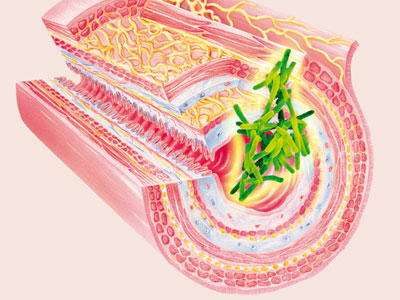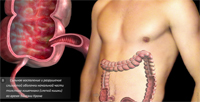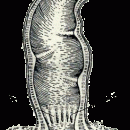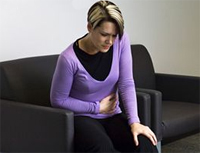With constant or night diarins, there are pains in the abdomen, weight lifestyle, fever, night sweating should be spoken to the gastroenterologist so as not to miss the Crohn disease.
Content
Crohn's disease — This is a chronic inflammatory disease of the gastrointestinal tract.
 For this disease, pain in the abdomen and diarrhea is characterized, which is sometimes accompanied by the appearance of mucus and blood in feces. Inflammation causes pain and swelling of the mucous membrane, lining the gastrointestinal tract (esophagus, stomach and intestines). If the disease is not treated, then inflammation progresses, individual sections of the mucous membrane are ulcerated, as a result, the scarring of ulcers and the narrowing of the lumen of the affected areas of the gastrointestinal tract occurs. A severe attack of the disease can be accompanied by bleeding from the affected area of the gastrointestinal tract, which can be deadly dangerous.
For this disease, pain in the abdomen and diarrhea is characterized, which is sometimes accompanied by the appearance of mucus and blood in feces. Inflammation causes pain and swelling of the mucous membrane, lining the gastrointestinal tract (esophagus, stomach and intestines). If the disease is not treated, then inflammation progresses, individual sections of the mucous membrane are ulcerated, as a result, the scarring of ulcers and the narrowing of the lumen of the affected areas of the gastrointestinal tract occurs. A severe attack of the disease can be accompanied by bleeding from the affected area of the gastrointestinal tract, which can be deadly dangerous.
Crohn's disease is manifested not earlier than six years; Most often, the first attacks of this disease appear in adolescents and young people aged 13 to 19 years. Approximately four of each five patients with this disease are experiencing its first symptoms under 40 years of age. Every year from 100,000 people aged 10 to 30 years old, Ten Disease Crown's disease.
This disease can not be predicted. It usually begins with a sharp attack, and then after a few weeks and months of treatment subsides (goes into the stage of remission) and again manifests months or years or years. In the typical form of the disease, primary symptoms appear aged 13 to 19, they are followed by repeated episodes of intestinal inflammation, which is sometimes accompanied by symptomatics of any one (or several) non-launching disease, requiring other methods of treatment. This can cause a violation of the normal function of the gastrointestinal tract, especially this refers to the suction of nutrients during digestion. In some cases, Crohn's disease can cause the appearance of various signs and symptoms similar to the signs and symptoms of youth rheumatoid arthritis, neurogenic anorexia, rheumatism or systemic red lupus.
Most people with Crohn's disease need medical supervision throughout their lives. Very few of them for a long time are missing all signs and symptoms of the disease, as if they had a long remission. In the hospital with a separate episode of this disease, as a rule, successfully coped. In adults patients with this disease, increased risk of intestinal cancer in old age.
Causes
The cause of Crohn's disease is unknown, although some researchers argue the opposite. Since diarrhea in this disease is the main symptom, as in food poisoning, then as a possible reason for the occurrence of Crohn's disease, a bacterial infection is sometimes called. This disease can begin in a child after his return from a foreign trip or after recovery from the intestinal disease. At this time, any specific or ordinary foods causing this disease are not installed; There is no scientific evidence of the existence of psychogenic or emotional reasons. Stress from any reason — Work, experiences, food — affects the health of the patient with many chronic diseases, including when Crohn's disease.
Although the role of heredity in the origin of this disease is not established, it is noted that the Crohn's disease sometimes affects several members of one family. In some families, this or that form of chronic inflammatory bowel disease is transmitted from generation to generation.
Signs and symptoms
 The main symptom of Crohn's disease is diarrhea, ranging from isolated cases of the appearance of loose and liquid chair and ending with numerous watery feces. Mucus, pus and blood in any combination can appear in the patient's chair.
The main symptom of Crohn's disease is diarrhea, ranging from isolated cases of the appearance of loose and liquid chair and ending with numerous watery feces. Mucus, pus and blood in any combination can appear in the patient's chair.
The rest of the intestinal symptoms include grabs-like stomach pain, accumulation of gases in the intestines, bloating and a loud rice in the stomach. Nausea and vomiting appear rarely. The general signs of the disease include loss of appetite, weight loss, growth retardation. Anemia and reducing plasma proteins — these are two serious blood pathology. Anemia and impaired absorption in the intestines often lead to the lethargy and apathy of the patient. The inflamed mucous membrane, lining the delicate intestine, is often ulcerated and bleeding. Blood appears in feces. Its content varies from not a noticeable amount of quantity, determined only with the help of chemical tests, to a large number, when a bright red, scarlet or dark red blood is covered with a feast of feces.
Long inflammation of the gastrointestinal tract often leads to an increase in temperature (about 37.8° WITH). With severe disease exacerbations, the temperature rises to 40° C and holds until the attack does not eat.
Inflammation of the joints carrying the main weight load (ankle, knee and hip), often cause pain, immobility and swelling — Symptoms, almost identical symptoms of youth rheumatoid arthritis. If the child does not heal immediately, he will walk with difficulty.
Diagnosis
The doctor's disease is diagnosed with a doctor, often a children's gastroenterologist (specialist in diseases of the digestive system), estimating all signs and symptoms of the disease. After examining the doctor, a radiographic study of a thin and thick bowel is carried out to establish the magnitude and severity of the lesion. Internal surveys of the mucous membrane, covering the lower division of the large intestine (direct and sigmoid intestine), with a thin containing the source of light of the instrument from plastic or metal (sigmoidoscope). The same, only a longer and flexible device, called a colonoscope, is used to inspect the inner surface of the colon. Sample samples of the patient in order to determine in it the presence of blood or the presence of infection.
Special studies may be required to determine the intestinal ability to suck nutrients. In some cases, the doctor may need to study a small sample of the intestine tissue (biopsy) in order to establish the presence of some specific disease.
Complications
Slowing growth is the most frequent and most serious complication of Crown's disease in young children. In case of intestinal bleeding, intestinal obstruction, sprinkling ulcers or a strong slowdown in a child's growth may require operational intervention. Inflammation of the joints can interfere with walking and normal physical activity, but it usually subsides with the improvement of the state of the gastrointestinal tract. The extraordinary lesions include rash, impairment of vision or unclear vision, liver activity.
Dehydration can be a serious complication in the severe cases of Crown's disease.









